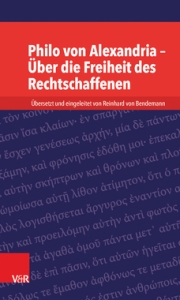 Vandenhoeck & Ruprech are publishing a new series of ancient Jewish and Christian works, in which also some volumes of Philo will be included.
Vandenhoeck & Ruprech are publishing a new series of ancient Jewish and Christian works, in which also some volumes of Philo will be included.
The series is presented thus:
Jürgen Wehnert (Hg.)
Kleine Bibliothek der antiken jüdischen und christlichen Literatur
“Die „Kleine Bibliothek der antiken jüdischen und christlichen Literatur“ möchte jüdische und christliche Texte vorstellen, die außerhalb der Hebräischen Bibel und des Neuen Testaments stehen, aber aufgrund ihrer religiösen Bedeutung sowie ihrer sprachlichen Schönheit eine Neuentdeckung lohnen. Die Bände sollen im halbjährigen Turnus erscheinen. In den Bänden werden jüdische und christliche Texte gleichgewichtig vertreten sein.” You can get more details here.
The first volume of Philo is published this spring:
Reinhard von Bendemann (Hg.),
Philo von Alexandria – Über die Freiheit des Rechtschaffenen.
Kleine Bibliothek der antiken jüdischen und christlichen Literatur –
Vandenhoeck & Ruprecht. 1. Auflage 2016. 89 Seiten kartoniert
ISBN 978-3-525-53465-6. 10,00 €
Five other volumes (not Philo’s) have also been published so far (see here), and these are to follow in the near future ( the V & R webpage contains no info about if or when there will be translations of more of Philo’s works):
Frühjahr 2016
Frank Schleritt / Jürgen Wehnert, Hegesipp und Papias. Die Reste der Werke zweier Kirchenväter, ca. 60 S., ca. 9,99 €Herbst 2016
Stefanie Holder, Josef und Aseneth, ca. 80 S., ca. 9,99 €
Felix Albrecht, 1. Klemensbrief, ca. 80 S., ca. 9,99 €Frühjahr 2017
Annette Steudel, Die Loblieder aus Qumran, ca. 65 S., ca. 9,99 €
Johanna Brankaer / Enno Edzard Popkes, Das Mariaevangelium/Das Judasevangelium/Das Thomasevangelium, ca. 80 S. , ca. 9,99 €Herbst 2017
Berndt Schaller, Das Testament Hiobs, ca. 80 S. , ca. 9,99 €
Felix Albrecht, Die Ignatiusbriefe/Der Brief des Polykarp, 80 S., ca. 9,99 €


